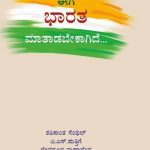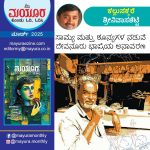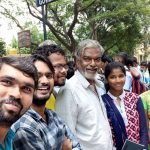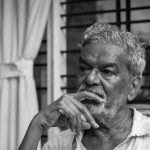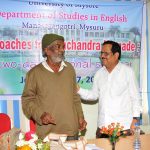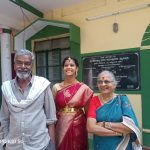“I get the feeling that we are living in a burial ground amidst the dead”
[This interview is recorded in Knit India Through Literature, Volume-1, The South, 1998. Our heartfelt thanks to V.L .Narasimhamurthy, a research student who found this and sent it to Namma Banavasi and Abhiruchi Ganesh, the publisher, who made the typescript, and Devanur Mahadeva, a writer and thinker, who edited some parts of this interview. ಈ ಸಂದರ್ಶನವು Knit India Through Literature, Volume-1, The South, 1998 ಕೃತಿಯಲ್ಲಿ ದಾಖಲಾಗಿದೆ. ಇದನ್ನು ಹುಡುಕಿ ನಮ್ಮ ಬನವಾಸಿಗೆ ಕಳಿಸಿಕೊಟ್ಟ ಸಂಶೋಧನಾ ವಿದ್ಯಾರ್ಥಿ, ವಿ.ಎಲ್.ನರಸಿಂಹಮೂರ್ತಿಯವರಿಗೆ ಹಾಗೂ ಬೆರಳಚ್ಚು ಮಾಡಿಸಿಕೊಟ್ಟ ಪ್ರಕಾಶಕರಾದ ಅಭಿರುಚಿ ಗಣೇಶ್ ಅವರಿಗೆ, ಹಾಗೂ ಈ ಸಂದರ್ಶನದ ಕೆಲ ಭಾಗಗಳನ್ನು ಪರಿಷ್ಕರಿಸಿ ಕೊಟ್ಟ ಸಾಹಿತಿಗಳೂ ಹಾಗೂ ಚಿಂತಕರೂ ಆದ ದೇವನೂರ ಮಹಾದೇವ ಅವರಿಗೆ ನಮ್ಮ ಹೃದಯಪೂರ್ವಕ ಧನ್ಯವಾದಗಳು.]
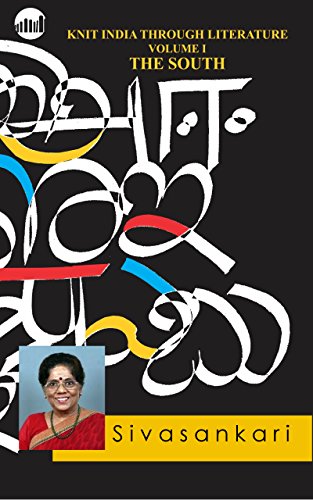
Forty year old DevanoorMahadeva, whose writing career began in the Navya phase, is today acknowledged by the literary community as an outstanding writer. He has been described by many as a modern writer and a universal writer.Despite his progressive thinking, he differs from the writers of the Pragatisila phase in that he is not one to raise loud slogans. His collection of short stories titled Dyavanooru is considered a milestone in Kannada literature. His novelette Kusumabale won him the SahityaAkademi Award.Mahadeva’s wife works as a college professor and the couple have two daughters.
I had difficulty meeting Mahadeva during my stay at Mysore. Both our proposed meeting, one at the residence of Mr. NatrajaPillai who works at CIIL and the other at Mahadeva’s residence, did not materialize. However, Mahadeva dispelled any regrets I had, when he came to my hotel on the day prior to my departure and met me for the interview.
Mahadeva is a very simple and unassuming person. He is also very shy and points out his inability to converse fluently in English. He seemed not only reserved but also a very private person.
I found Mahadeva sincere and simple in his thoughts and speech.
* * *
-
What was the background in which your first story was born?
Actually, it was a funny situation. As a boy, I was losing in studies and often used to fail in the exams. When I failed on clear my P.U.C. exams, my father, a police constable, became desperate and put me in lockup to make me sit and study. I failed to study even then, I wrote my first short story. “Turning of darkness”.
It was just a normal story. It was set in village atmosphere and was full of melodrama. So, I did not include it in my collection of short stories published later.
-
From when did you begin to write to your satisfaction, avoiding melodrama?
It is very hard to pinpoint the exact time. I cannot say that I have attained that level of satisfaction even now. At times, after writing a particular story. I am satisfied but not always. While I was still doing my P.U.C., I wrote my next story Marikondavaru. The theme was that the poor are selling not just their labour but their self respect too.
* Did the desire to become a writer sprout in you even during childhood?
Not really. I was interested in reading literature and it occurred to me that perhaps I could write too. So, I wrote and that was it.
-
Did you idolize any particular writer?
In the beginning, liked everybody who wrote good literature. It was only after I began to write that I felt drawn to the writings of BesagarahalliRamanna. I was able to sense the rural flavor in him. My first story was probably influenced by his writings.
-
What is your opinion of the distinctions observed in Kannada literature like Navodaya, Pragatisila, Navya, Bandaya, Dalit and the like?
During particular phases, some specific emotions and pressures surface which are understood and classified. Those who make the classifications, though, should realize that literature must remain literature at all times and thank if such reasons and themes begin to dominate literature, then no writing will become literature.
-
Have you been much affected by being horn a Dalit?
The hurt and pain felt on a personal level are not much. But I have been severely wounded by what I observed or heard had happened to others and those who belonged to my community. I still continue of be wounded. For instance, in a nearby village, the people of the village, including the Dalits, collected funds and built a temple, but then the Harijans were refused entry. When they rebelled against this injustice and attempted to enter the temple precincts, two of them were killed. In my opinion, along with the two of them justice too was murdered. On seeing things, I get the feeling that we are living in a burial ground amidst the dead.
-
Just as you are deeply affected by the suffering of others, is it not possible that a person born of a high caste can be affected enough by these problems to write about them? That being the case, why the slogan that only a Dalit can write effectively about the problem of the Dalits?
In another interview, I had referred to a story of Premchand and said that he had portrayed rural life in a highly realistic manner and that I liked it very much. In fact, reading that story proved to be a wonderful experience.
Similarly, I welcome the efforts of anybody who is willing to portray the life problems of the oppressed classes in a realistic manner. If rules are made saying that only certain people can write about particular topics or people, then men will not be able to write on women and women on men. One’s writing is also adversely affected if one tends to be very subjective. While saying this, it must be pointed out that though the ability to understand and empathize with others is one of the basic tenets of writing, lack of experience or understanding may result in fine details being omitted.
-
Do you believe that stories should be based on real life instances?
I refer to real life incidents ‘Nepa’ is to stories what air is to the people.
-
If you were asked why you are writing, what would you reply?
Can I put that question to you?
-
To me, writing is an effort to share. When we share our knowledge with others due to concern for them and society, there is certain satisfaction.
Very true, I quite agree with you, it is usual for a person to write for the reason you cite. Other than that, when I think emotionally, getting to know a lot of things and trying to understand what I know are also reasons. In spite of this, logical reasoning like why, how or what do not suit a writer. The reasons may be different on different occasions- at times, this and at other times, that. Nothing is ever constant.
-
What was the theme of your novel Kusumabale that won you the SahityaAkademi Award? What was your motive in writing it?
I do not believe in talking about my work. I aired the same view when I participated at the International Writers Workshop that takes place annually at lowaUniversity. “In the first place, I am not a good speaker. Secondly, as I said earlier I do not believe in talking of my writings. Hence, I have made a small note on my works. Those who wish can read it.” I said, if you like, I can give you those notes. Please do not compel me to speak.
-
Since you mentioned the town workshop. I recall an incident that occurred when I participated in it. The short story walk of the Argentine writer Carlos could not be comprehended by the others at the workshop and they wanted him to elucidate on the subject. Carlos refused saying it was his job only to write and not to explain. Do you accept his argument?
Yes. If the reader felt that the required explanation was present in the story, then there was no need to elaborate further. If the explanation offered by the writer were to differ from what the reader understood then the explanation would be rendered meaningless. Also, if the writer writes something and then gives a different explanation, only confusion will result. Hence, even when viewed from different angles, it is not the job of the writer to offer explanations. In my opinion, good writing has a self explanatory quality and needs no further explanations.
-
In the case of Carlos’ story, the inability to understand was because the process of communication was incomplete, wasn’t it?
If proper communication did not take place, probably it was something that could not be communicated. There are writing that cannot be brushed aside simply because they cannot be understood. A writer is creator. If a creator has to explain his creation, then why write?
-
You have not mentioned Latin American or African literature? What kind of an impact did these writings have on you?
I am not a very well read person. So, I cannot answer your question in detail, but I can tell you that I like Tolstoy and Shakespeare.
-
To what extent do you feel Kannada literature has reflected the social changes of the times?
It is very difficult to quantify that which cannot be seen but can only be felt. There has definitely been and impact. Only on small level, though. For example, take our epics. Ramayana and Mahabharata.If you look into the minds of our simple illiterate folk, you will find that the these epics have made a significant impact. In the present times, we can observe the Ramayana has inspired the commoner, living amidst great difficulties, to think. There is definitely an impact, however small. It cannot be refuted. This change cannot be observed visually.
Once, an old Brahmin came to meet me after he had read a novel of mine. “Till date I have never touched an untouchable, nor even moved close to one. But, I feel the old lady in your story is like my grandmother,” he said. In order to influence such an old Brahmin. I may have to create several hundred characters. A seed might be sown somewhere that will cause changes to occur slowly.
There have been a few such writings in Kannada literature that have caused an impact, though not several. There are such outstanding poets as Bendre, writers as Kuvempu and several other infinitely talented, creative people who belong to Kannada literature.
-
Who are the writers belonging to the younger generation who have impressed you?
Abdul Rasheed is a writer of wonderful short stories. Mogalli, I guess, is full of talent and so gives rise to a lot of expectations. Of late, women like Savitha Nagabhushana, Mamatha Sagar and Sarvamangala write beautiful poetry.
-
When I spoke to the senior writer Chaduranga, he praised you saying ‘Mahadeva is a universal writer’. Since others too have expressed similar views, do you approve of being branded as a Dalit writer?
I neither approve nor welcome it. I try not to retain such labels in my memory. I brush it away as not my problem.
…

